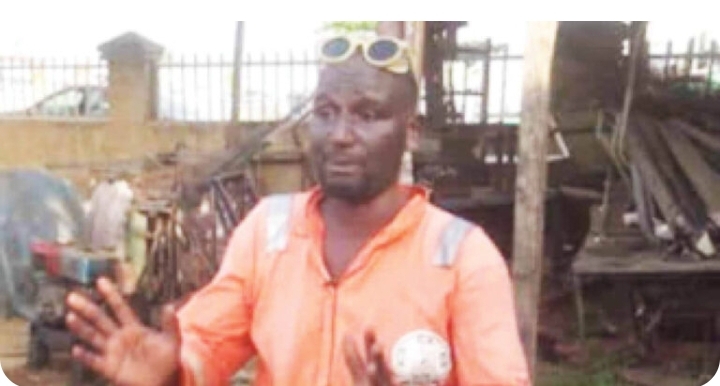Operating a workshop in Zaria, the distinguished academic conducts his welding business on the roadside without any sense of self-importance.
In an interview with Daily Trust Saturday, Professor Abu-Bilal, a professor of Electrical and Electronics Engineering, expressed that welding has been a passion for him and serves as another means of utilizing his God-given talents to achieve self-reliance.
He shared that despite achieving outstanding results as an arts student during his secondary school days, his friends mocked him because he wasn’t a science student. This experience became a challenge for him, prompting him to enroll in a program and pursue sciences despite lacking a background in science subjects.
“After one year of my studies as a science student I sat for the West African School Certificate Examination (WASCE) and incidentally became the best science student in the set, having passed all the subjects with flying colours.
“That was how I got admission into the ABU to read Electrical and Electronics Engineering as an undergraduate.
“And because I graduated with first class I was instantly offered a lecturing job in the same university. From there I rose to the rank of professor, with specialisation in Mechatronics Engineering,” he also said.
The professor explained that the passion for handiwork was driven from to his academic discipline, where he teaches students both theory and practical aspects of the course.
“Since we deal with electrical equipment during our practical lessons, I easily developed the passion for welding and started doing it with some of my students, who are more brilliant than me in the practical.
“I, therefore, learnt more of practical from them and added it to my theatrical knowledge, which made me understand the trade faster,” he added.
Prof Abu-Bilal noted that while at the practical workshop of the university, private works started to troop in and they started generating money outside job until the authorities realised and put a ban on any outside job.
He further said, “Instead of the university authorities to collaborate with me so as to generate some revenue for the department and institution as a whole, they felt putting a ban on us was the only option.
“I then came out of the university to search for a place. I got it and immediately established my welding workshop there.”
The university professor, however, mentioned that he had to start from scratch since he lacked the necessary tools and machines to enhance the welding and fabrication business. Despite the initial challenges, he managed to weather the storm and find his footing in the workshop.
Professor Abu-Bilal emphasized that the income generated from the workshop in a month doubled his monthly salary as a professor, highlighting the rewarding nature of manual work. He recalled that during the last strike by the Academic Staff Union of Universities (ASUU), when lecturers went without salaries for eight months, his lifestyle remained unaffected as he did not feel the impact of the industrial action.
“In fact, some of my colleagues came here to borrow money because they learnt in the hard way. Others just came for help due to the non- payment of salaries.
“This is why I keep telling my students to learn skills so that they can be self-employed, with or without government jobs,” he also said.
He said he had fabricated so many machines for public use, including drilling machines for shallow boreholes. He produced a compressed soil block machine for construction work and scissor lift for conveying people and equipment to a height during construction jobs.
Others include a flour milling machine for bakeries and many smaller irrigation machines for agricultural purposes.
“Right now, the welding machine generator I am using in my workshop is not using the costly petroleum but liquidities petroleum gas. I am the one who worked it out to reduce cost.
“I am also working to convert many machines that use petroleum products into gas to ease hardship faced by Nigerians using petrol.
“All I require is empowerment to be able to roll out my conceived ideas for the betterment of the society,” he added.
He, however, said he had no intention of leaving the country for any foreign land except it is for training.
“Nigeria is my Germany, it is my China and Japan, so I will rather stay here and develop my country than develop other people’s country.
“We have the potentials and capacity to be whatever we want. Inasmuch as we can concentrate and generate incentives from the government, we can become anything,” he concluded.
Source: Daily Trust
